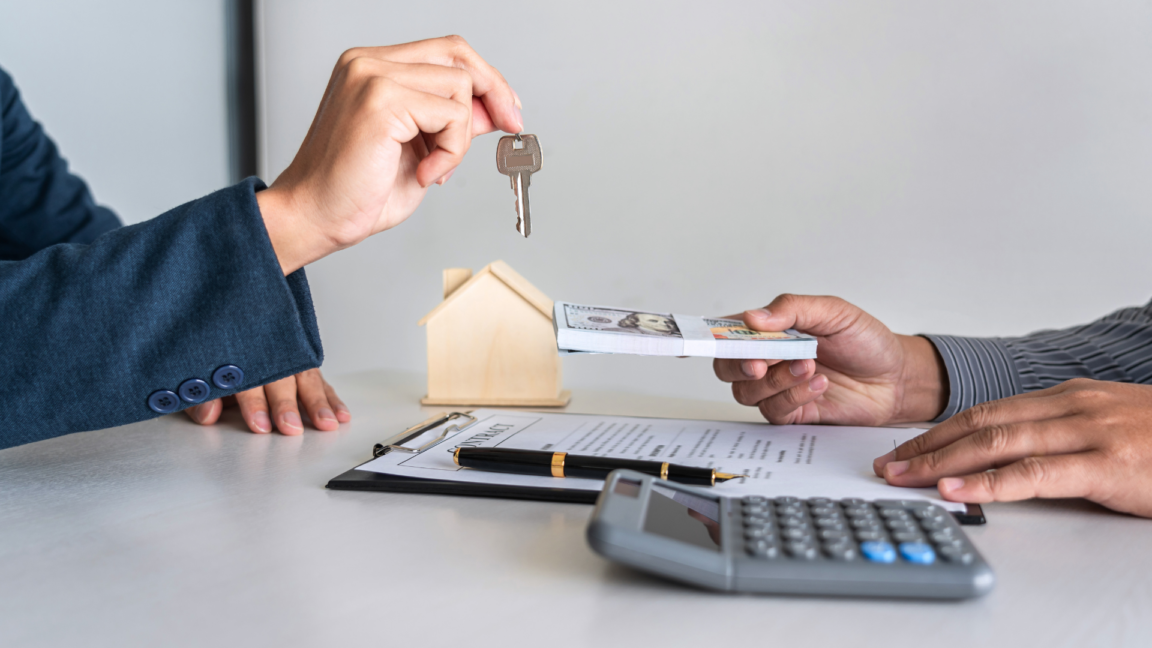In Short
Advice
When it comes to fulfilling the dream of owning a home, purchasing a second-hand house has become a popular choice. Whether it's for personal residence, investment purposes, or potential profit through resale or renting, many people consider second-hand properties as an attractive option. However, amidst the excitement of finding the perfect house, the crucial question remains: "What is the best approach to buying a second-hand home to avoid future complications?" Should you directly negotiate with homeowners, explore government property auctions, or consider bank-owned properties? In this article, we will explore the advantages and disadvantages of each avenue, helping you make an informed decision for a smooth and hassle-free house-hunting journey.
Buying from the previous owner directly

Directly buying a second-hand house or condo from the previous owner is one of the most common methods of securing a second-hand property both for residential AND investment purposes.
Benefits
- Save on costs compared to buying through an agent as there are no agent fees involved.
- Direct negotiation is possible since the seller has full decision-making authority as the homeowner.
- Agreement on transfer expenses is negotiable. Buyers can directly discuss responsibilities for fees incurred during the transfer.
- Joint responsibility for transfer fees can be split equally or assigned to the buyer or seller, based on mutual agreement, making negotiations straightforward and swift.
- Purchasing directly from the homeowner ensures the seller's willingness to sell, avoiding the lengthy process of dealing with reluctant sellers and potential legal disputes.
- The process is less complicated, dependent on the agreement between the buyer and seller, involving fewer intermediaries, resulting in a smoother transaction.
Drawbacks
- Sometimes, house prices may be higher due to added value from renovations, beautiful decorations, or being ready to move in.
- Issues may arise when both parties have their own contract preferences, leading to discrepancies that may delay negotiations, as each side aims for maximum benefits.
- Selecting a house without thoroughly reviewing the contract can lead to problems during the property transfer process.
Bidding a House from the Department of Legal Execution

"Auctioning Houses from the Department of Legal Execution", commonly known as "Distressed Property Sales", refers to homes used as collateral for bank loans, but when the borrowers fail to repay, the bank files for legal execution. The court then orders the house to be auctioned through the Department of Legal Execution, allowing interested parties to bid on the property. The proceeds from the auction are used to repay the outstanding debt to the bank.
If you are interested in purchasing such second-hand homes, you need to deposit a guarantee amount based on the appraised value and have a specified timeframe for payment. Once you win the auction, you must settle the payment within 15 days. However, if you are in the process of gathering funds or applying for a loan, you can request an extension for the payment period. Failure to pay the remaining amount within the specified time will result in the forfeiture of your deposit.
Benefits
- The price is lower than the market value because the seller wants to settle the debt quickly. Generally, the price is approximately 30%-50% lower than the market value, depending on various factors such as the condition of the house and its location.
- Numerous locations to choose from, some better than others or rarer than others.
Drawbacks
- There might be turmoil involved, as the previous owner may still be unwilling to move out due to various reasons, such as not having an alternative place to go. This may lead to eviction proceedings being carried out, and at this point, the house remains under the ownership of the previous owner. Any interference with the property during this time would be considered trespassing and illegal.
- Sometimes, the property may end up being more expensive than initially intended. This situation often occurs when bidding against the bank in an auction, as they tend to set high starting prices. If you know you are competing with the bank, it's better to stop bidding to avoid unnecessary expenses.
- If you withdraw your bid and the auction concludes, you will leave empty-handed. You may consider participating in another auction or exploring other property listings instead.
Non-Performing Assets (NPA)

NPA stands for "Non-Performing Assets," which refers to properties that banks repurchase through auction from assets taken by the Department of Legal Execution for distressed property sales.
Benefits
- NPA properties are often located in densely populated areas, making them suitable for investment or residential purposes. They are close to various amenities and conveniences. Alternatively, those seeking to buy in more remote areas away from the city center can also consider NPA properties.
- The price of NPA properties is favorable because, in the present, central city locations have considerably higher land and property prices, making them difficult to afford. However, NPA properties are typically 10-15% cheaper than regular properties in the market. Moreover, they come with clear ownership rights, making them an attractive option for buyers.
- Safe and worry-free! No need to fear fraud, as these properties come with legitimate and clear ownership titles, ensuring their safety and authenticity.
- Highly worthwhile for investment, whether it's for renovating and reselling the property or starting a business in the same area, it is well-suited for both purposes.
Drawbacks
- It is essential to thoroughly study the loan conditions because some banks may have terms stating that they will not refund the bidding deposit or earnest money if the loan application is not approved.
Buying through an Agent

When buying a house, it may be worth considering professional real estate agents. Sometimes, we refer to them as "agents." Each agent has similar core responsibilities, but the level of service may vary. A good agent acts as a coordinator, easing the complexities of negotiations between the seller and the buyer.
Benefits
- Guidance and support throughout the entire process.
- Increases the chances of finding a home that matches your preferences.
- Enhances opportunities to purchase a house at a favorable price.
- Facilitates a smoother buying experience.
- Saves time as you won't have to search for houses on your own.
- Eliminates the need to pay agent fees until a purchase agreement is reached.
Drawbacks
- It is essential to verify that the agent you are using for the service is trustworthy.
- Some agents may add a premium to the market price. Therefore, it's essential to verify the market price to ensure clarity.
Second hand house selection tips

Inspect the house before making your decision
In today's era, finding a second-hand house that suits your preferences has become more convenient. Buyers can explore online channels, such as various property listing websites, instead of physically searching for houses in the desired location. However, even with detailed house descriptions and clear images available on these websites, it is crucial to visit and inspect the property and its surroundings before making a decision.
This step of physically visiting the property is indispensable when purchasing a second-hand house. It helps us understand if the house is currently occupied or if there are any potential trespassers or tenants. Sometimes, the seller might claim that the house is unoccupied and ready for immediate transfer, but upon inspection, one might discover otherwise – finding tenants or squatters.
If such a situation arises, it is essential to seek clarification from the seller or owner regarding the status of the trespassers or tenants and when their contracts will end. This ensures that there won't be any issues when moving into the house after the property is transferred.
Therefore, the step of visiting and inspecting the property before finalizing the purchase is crucial and should not be overlooked. Additionally, conducting a thorough structural inspection is equally significant in the process of buying a second-hand house. It helps ensure that the house is in good condition and free from any potential problems.
Verify the Title Deed's Validity
Another crucial step in buying a second-hand house is verifying the validity of the title deed, which buyers should not overlook. The title deed provided by the seller may contain inaccurate or forged information, such as being free of encumbrances despite being mortgaged by the bank, being a fake deed, or being under seizure.
Moreover, checking the title deed helps us understand the details of the property's rightful owner. This ensures that the seller is the true owner and not posing as one, as sometimes the seller may not be the actual owner or falsely claim to be, leading to potential damages for the buyer, such as losing the deposit money due to fraud.
Therefore, in the process of buying a second-hand house, verifying the authenticity of the title deed is crucial. This can be done by taking the deed to the land office or through a simple method of getting a property valuation.
This method not only ensures the validity of the title deed but also provides valuable information on the property's market value. It can be used as a reference for negotiating the price with the seller if the selling price exceeds the assessed value.
Finalize the fees and expenses
When buying a house, whether it's a first-hand or second-hand property, there will be various expenses involved, which are crucial final steps in the process, especially for purchasing a second-hand house that often incurs higher costs than a new one.
These expenses include income tax withholding, transfer fees, specific business tax, stamp duty, and other related charges, which when combined, can amount to a significant sum. If the buyer and seller don't have a clear agreement, misunderstandings may arise. For instance, the seller may push the burden of all expenses onto the buyer without them realizing it, or the buyer might assume that the seller will cover all the costs.
Such misunderstandings can lead to disputes and conflicts later on. Therefore, once the decision to buy the second-hand house is made, it is essential to have a clear understanding and agreement on the various expenses. This includes who will be responsible for paying what, whether they will share the costs equally, and the conditions for deposit payments. It's crucial to document all these agreements in writing within the purchase and sale contract.
So.... Is buying a second-hand house ideal?
Each source of second-hand house sales has its unique advantages and points of concern. PropertyScout recommends that as a buyer, you should utilize the best decision-making power to avoid regrets later on. What matters most is to compare the selling prices within the same location to find a second-hand house that suits both your preferences and budget.
Moreover, it's essential to prepare at least 20% of the house price as savings for the down payment and to carefully compare interest rates for housing loans offered by different banks before making a decision.
Regarding the various purchasing options suggested in this article, it ultimately depends on each individual's discretion. These are mere recommendations to help everyone make informed decisions. You can weigh the pros and cons of each approach to find the most suitable one for you.
From Second-Hand Houses to condos and other property types, PropertyScout is here to help make your dream haven an epic reality with our expansive selection of over 270,000 properties throughout Thailand!
FAQs
Lorem ipsum dolor sit amet, consectetur adipiscing elit. Suspendisse varius enim in eros elementum tristique.
Explore More Topics
Free real estate resources and tips on how to capitalise



